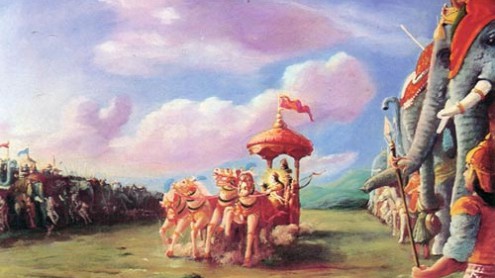Business prospectives have changed since the character Gordon Gekko quoted Sun Tzu in Oliver Stone’s movie “Wall Street”. Since then the business world and academia started to explore the wisdom in the ancient Eastern scriptures called the Vedas and their corollaries. Phrases from the Bhagavad-gita pop up in management tomes and on the Web sites of consultants.

Top business schools teach “self-mastery” classes that use Indian methods to help boost managerial and leadership skills while also finding inner peace in a life dominated by work. Twenty years after “Wall Street” we can ask: “Can the Bhagavad-gita compete with “The Art of War” as the new ancient Eastern management text?” The answer is yes. At this time when the global economy has been shaken up, the business world is more open to new proposals and insights. India has always been a source of life-transforming wisdom. From all over the world, people make pilgrimages to India to find their centre and reintegrate their spirit. It is true today, and it is been true since the dawn of recorded history. The hidden secret of India is in the country’s ancient texts, the Vedas. “Vedic” means “pertaining to the Vedas.” The Vedas are a collection of mantras. The word Veda is derived from the Sanskrit root “vid” (which means “knowledge”); hence the Vedas are the books of knowledge in all fields of activities. They show the way to properly lead a life in balance with nature and others. Many strategic and practical tools for modern business leaders are hidden in humanity’s oldest books. Still, Vedic books are an enigma.

So a major challenge in the twenty-first century is to understand the increasing influence of Indian thought and cultures. When we look at the very oldest piece of writing in India, we find absolutely relevant business principles and achievements:
“Wherever there is Krishna, the master of all mystics, and wherever there is Arjuna, the supreme archer, there will also certainly be opulence, victory, extraordinary power, and morality. That is my opinion.” (Bhagavad-gita 18.78)
The Vedas are arguably the most famous books in the world that are almost completely unknown. While almost everyone may have heard of them, very few people have read them. This early anticipation of modern thought leads us to an intriguing avenue: perhaps human beings really are no smarter today than they were five millennia ago, at the dawn of recorded history.
Author: Dario Knez
